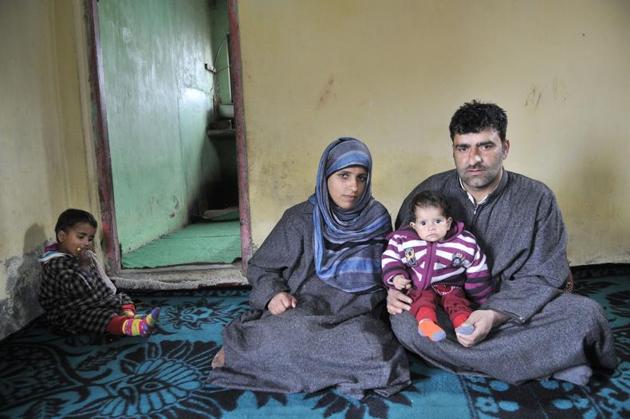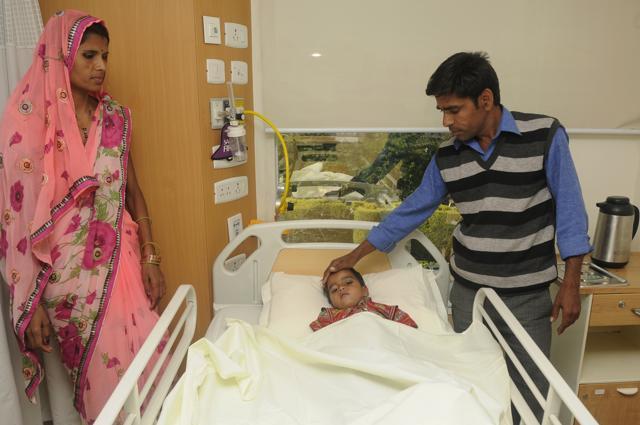Delayed surgery increases health risks for kids with congenital heart defects
India’s overburdened public health system is often unable to provide timely life-saving surgeries to many children born with congenital heart defects. You can help
It’s heartbreaking to watch one-year-old Ayat Imtiyaz giggling in her mother’s lap in their home in a village in north Kashmir while her unsmiling mother watches her play. Unlike her baby, she knows the large hole in her daughter’s heart threatens her life if it is not surgically fixed very quickly.

“If the heart operation is not done, my daughter will not live. A surgery can help her live a normal life,” says Ayat’s father Imtiyaz Ahmed Rah, 36, who has taken her to GB Pant Children Hospital in Srinagar to get treated.
“Ayat has a large hole in her heart that needs to be closed as soon as possible,” said the paediatric cardiologist at the hospital, who did not want to be named because she is not authorised to speak to the media. “She is already a year old and if she is not operated upon before she turns two, her chances of survival will drop drastically. We cannot afford to wait.”
Ayat’s father Rah, who makes small wood products for a living and earns Rs 7,000 a month, knows that but doesn’t have the Rs 3 lakh needed for his daughter’s surgery.
“I die a thousand times each day,” says Ayat’s mother Saima, 27, who is a homemaker.
The couple, who got married in 2012, lost their first baby to Down Syndrome three months after birth. They now have two children, their son Fazil, born in December 2015, and Ayat, born on March 21 last year.
Babes in need
Eight babies per 1,000 live births are born with a heart defect, but only three are critical enough to need corrective surgery. In most cases, diagnosis happens late and close to 40 per cent children with congenital heart defects reach surgeons at a critical stage.
Corrective surgery within a year of birth can help children with heart defects lead a normal life.

“Once operated, kids lead an absolutely normal life. The surgery has got 97 per cent success rate. Most children in India, however, don’t make it in time because of lack of awareness and lack of funds,” said Dr Kulbhushan S Dagar, director, neonatal & congenital heart surgery, Max Healthcare, who is also treating a child who hasn’t undergone surgery because his parents can’t afford it.
Manish Kumar turns 4 on April 4, but he’s too sick to celebrate. Manish has a congenital heart defect that makes even the slightest movement exhausting for him. He becomes breathless and collapses after taking a couple of steps and has difficulty eating, which leads to his undernourishment.
He’s a virtual prisoner in his little body – he can’t play, doesn’t go to school and has no friends.
A surgery to correct his heart defect within six months to one year after birth could have helped Manish lead a normal life, but his parents didn’t have the Rs 3 lakh needed for surgery. And it is not likely to happen soon, because his parents earn about Rs 3,000 a month working as daily wagers in a village 15 km from Aligarh.
Risky delay
The delay in surgery puts Manish at very high risk of getting a stroke that can kill him. “We can’t really tell how long he can survive with a bad heart. His heart is stressed out and any delay in surgery will make the recovery fraught with challenges,” says Dr Dagar.
Manish has double outlet right ventricle (DORV) and ventricular septal defect (VSD) with pulmonary stenosis, which is popularly referred to as a hole in the heart along with other heart anomalies that lead to oxygenated and deoxygenated blood getting mixed up. Constricted blood vessels also prevent blood from reaching his lungs for purification.
“He had low birth weight and developed pneumonia when he was six months old. The doctor in our village could not treat him, so we took him to city doctors, who diagnosed him with a hole in his heart and recommended early surgery,” says Vijay Kumar, Manish’s father, who is in Delhi for his son’s treatment with the help of Delhi-based NGO Genesis Foundation, which helps children with heart defects get treated.
Worrying delays
Challenges remain. The waiting period is often very long in government hospitals, while treatment at private hospitals is something poor parents cannot afford.
The wait for paediatric heart surgeries at the All India Institute of Medical Sciences (AIIMS) in Delhi runs into years even when 12-15 surgeries to treat congenital heart defects are done every day.
“We not only treat patients from India but also from other countries, which makes the waiting period long. We prioritise surgeries based on the urgency of the case,” said Dr A K Bisoi, professor in the department of cardiothoracic surgery, AIIMS.
Most of these abnormalities can be picked up during pregnancy, but there is massive under-reporting because many women don’t get screened during pregnancy.
“These abnormalities can be diagnosed through a scan called the foetal echo. All pregnant women should ideally get the scan done under the supervision of a cardiologist between 16th and 20th week, more so for those who have had a family history,” said Dr Bisoi.
Catch your daily dose of Fashion, Health, Festivals, Travel, Relationship, Recipe and all the other Latest Lifestyle News on Hindustan Times Website and APPs.



